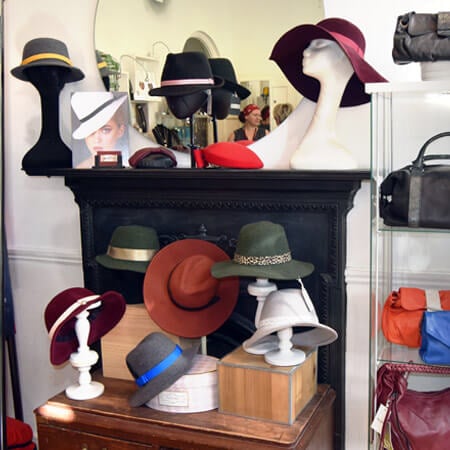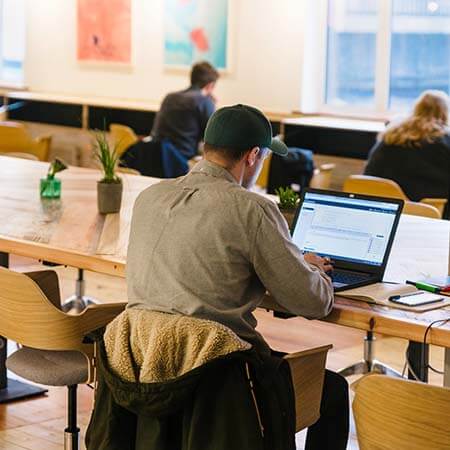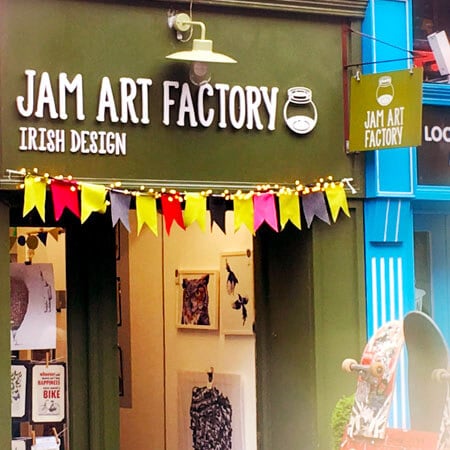Co-working that went from pop-up to permanent
The Fumbally Exchange began as part of the pop-up space revolution that took Dublin by storm a few years ago. Its name came from its first temporary location, which was on Fumbally Lane – right next to the well-known Fumbally Café.
Today, however, the Fumbally Exchange has a permanent home in the freshly refurbished Argus House in the popular Blackpitts area of Dublin 8. It has even expanded to a second location in Waterford.
So what exactly is the Fumbally Exchange?
Fumbally Exchange is a community of artists, designers and business people co-working together in one space. It focuses on innovative, design-centric small businesses, as well as urban renewal. (Its two current locations saw old buildings refurbished and given a new lease of life.)
George Boyle, founder and architect, tells us more.
A movement of people working on a small scale in a collaborative way…
The Fumbally Exchange started back in 2010 as part of what George calls a “recession response”. She’d just lost her job and wanted to do something new. The idea was to help startups in the creative, design and innovation fields by providing a co-working space where people could collaborate freely.
She managed to pick up a premises with low rent and something clicked. Now, Fumbally Exchange is nationwide and still expanding.

George tells us that she finds the anthropology of the place fascinating – having so many people of different disciplines working in such close proximity. If you didn’t know what they got up to, you could be forgiven for thinking it was some sort of bizarre social experiment. So what actually goes on at the Fumbally Exchange?
George sums it up as “a movement of people working on a small scale in a collaborative way”. There are spaces for people and companies to work, spaces to collaborate, spaces for exhibitions, spaces for storytelling. Sounds like a creative’s dream.
So what was it like, starting during the recession? “It was really bleak – there wasn’t much going on,” says George. Despite – or maybe because of – all the doom and gloom, the Fumbally Exchange became a bit of a beacon of light in the darkness. “Our only PR”, says George, “was to do what we do well”.
Community-focused co-working
From the very beginning, the Fumbally Exchange has been a not-for-profit social enterprise and this core ethos still remains. It’s the spirit of doing it for yourself and the not-for-profit approach that makes the whole thing work. It allows the Fumbally Exchange to do its thing without big corporate Ireland breathing down its neck, looking for an immediate return on investment.
Interestingly, it’s George’s training as an architect that she credits with teaching her to “learn to make opportunities where no one else can see them”. And that’s exactly what she did.
Would you enjoy working in a jungle? We can get you a #coworking space in a jungle (minus the heat!). Or, you can join us and grow your own plants. This green curtain is all @feenish's doing! pic.twitter.com/pdj2ebijJM
— Fumbally Exchange CLG (@FumballyExch) August 18, 2022
Today, this space is home to creatives working on everything from product design and photography through to joinery and digital media.
So what does the future hold? Although it has long completed its original purpose as a recession-recovery tool, Fumbally Exchange continues to support creatives and provide opportunities that aren’t available elsewhere in Dublin.
Our only PR was to do what we do well.
At its permanent home in The Liberties, it continues to provide a hub for the city’s innovators to network, share knowledge and create. Although other creative co-working spaces, like the Tara Building, Studio 9 and the Chocolate Factory, have cropped up too, the Fumbally Exchange still offers something unique and is certainly worth its weight in gold.
The community is always looking for suitable entrepreneurial members to join its ranks. Its always on the lookout for new premises to rejuvenate too.
Searching for a place to work? Check out our comprehensive guide to co-working spaces in Dublin city.



